In the world of metal cutting, precision matters. So does tool life, surface finish, and overall production cost.
That’s where dụng cụ cắt cacbua vonfram shine. These tools are used by professionals in hàng không vũ trụ, ô tô, thuộc về y học, dầu khí, and many other industries.
But why are they so popular? Why are so many manufacturers switching from high-speed steel (HSS) or other materials to tungsten carbide tools?
In this blog, we’ll explain the top reasons why these tools stand out, how they improve your machining performance, and what benefits you can expect from making the switch.
Extreme Hardness for Better Cutting Performance
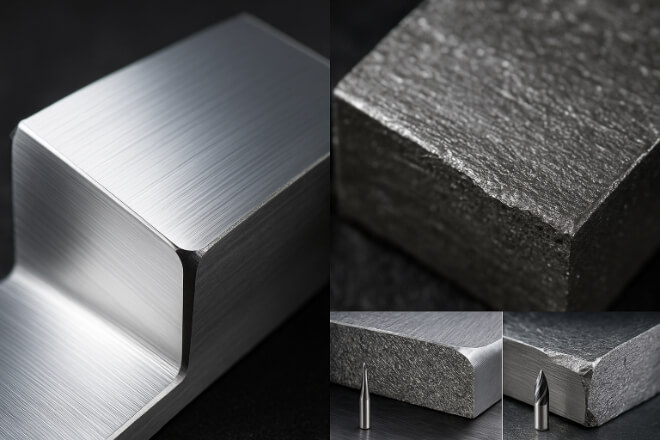
Tungsten carbide is one of the hardest tool materials in the world. It ranks around 9 on the Mohs scale, just below diamond.
This extreme hardness allows the tool to:
Cut tough materials like stainless steel, titanium, and cast iron
Maintain its edge longer than HSS or ceramic tools
Operate at higher speeds without dulling quickly
For decision-makers, this translates to higher efficiency and fewer tool changes during production.
High Wear Resistance = Longer Tool Life
Tungsten carbide tools resist wear even in high-friction or high-heat applications.
This means your tools stay sharp longer and can handle repeated passes without losing precision.
Here’s a quick comparison:
| Vật liệu | Average Tool Life | Best Used For |
|---|---|---|
| Thép tốc độ cao (HSS) | Low to Medium | Soft metals, wood |
| Carbide | Cao | Hard metals, long runs |
| Gốm sứ | Trung bình | High-speed finishing |
With carbide tools, you reduce how often you stop production to replace tools—saving you both time and labor cost.
Heat Resistance Improves Cutting Speeds
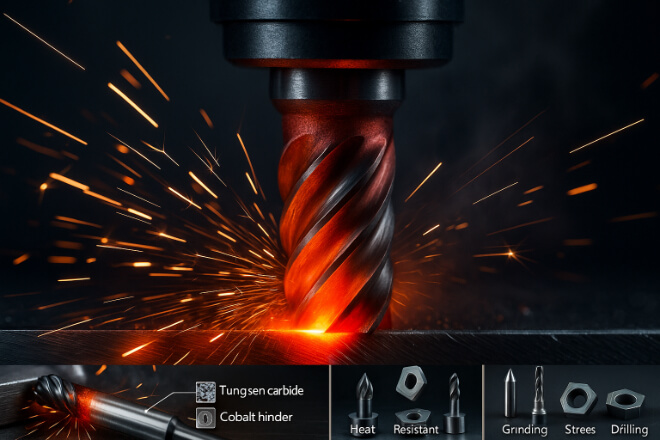
One major reason why carbide performs well in high-speed machining is its resistance to heat.
Tungsten carbide can handle temperatures above 1000°C without softening.
This gives your machine operators the ability to:
Increase feed rates
Reduce cycle times
Improve production output
Less heat buildup also means less deformation in your parts, leading to better surface finishes.
Excellent Surface Finish

A sharp, strong tool creates clean cuts. Carbide tools produce smoother surface finishes compared to dulling HSS or cheaper alternatives.
This matters in industries where the final product is critical—like aerospace parts, surgical tools, and injection molds.
Smoother finishes mean:
Less post-processing (grinding, polishing)
Higher precision parts
Better mating of components
Versatile Tool Geometry Options
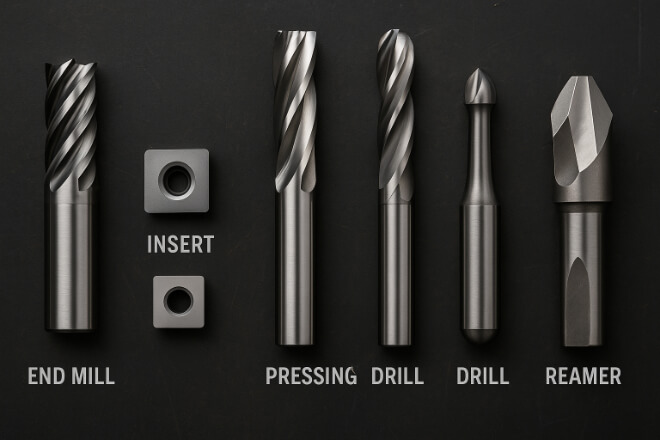
Tungsten carbide can be ground into a wide variety of shapes and geometries—flat end mills, ball nose, inserts, drills, reamers, and more.
That flexibility helps you tackle:
Grooving
Slotting
Facing
Profiling
Threading
No matter your application, carbide tools can be customized to fit your specific machining requirements.
Compatibility with Advanced Coatings
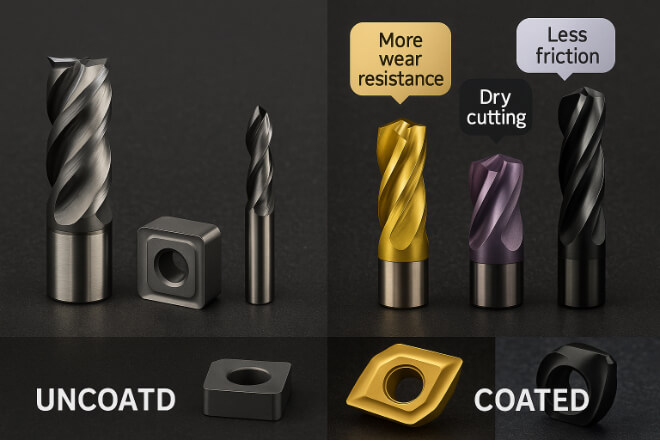
Carbide tools are often coated with materials like TiN (Titanium Nitride), TiAlN (Titanium Aluminum Nitride), or diamond-like carbon (DLC).
These coatings:
Boost khả năng chống mài mòn
Giảm ma sát
Kéo dài tuổi thọ dụng cụ
Cho phép gia công khô trong một số trường hợp
Your productivity goes up while tool costs come down in the long run.
| Lớp phủ | Lợi ích chính | Ideal Use Case |
|---|---|---|
| TiN | Khả năng chống mài mòn | Gia công chung |
| TiAlN | Khả năng chịu nhiệt | High-speed cutting |
| DLC | Low friction | Aluminum or plastics |
Ideal for Automation and CNC Machining
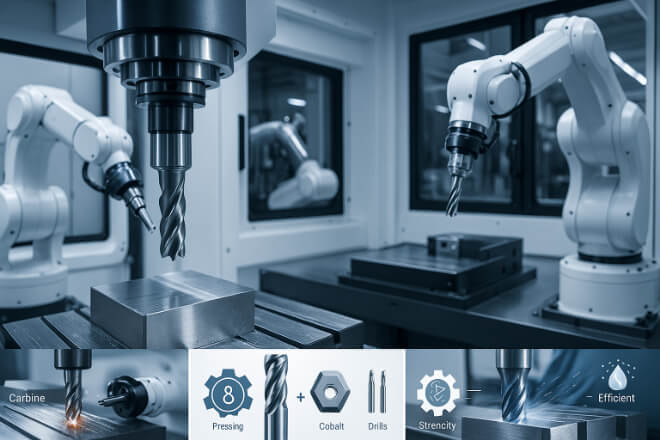
If you rely on CNC machining or robotic automation, tungsten carbide tools are the smart choice. Their consistency and durability make them perfect for:
Unattended machining
Long production runs
Tight tolerance parts
When your tools last longer and require fewer changes, your machines can keep running without constant supervision.
Better Cost-Per-Part Ratio
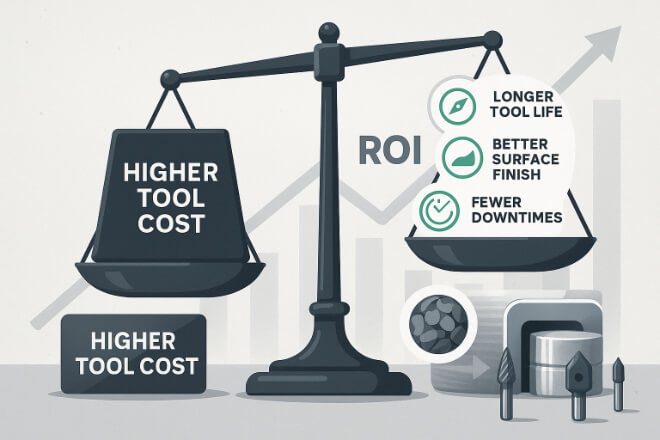
Carbide tools may have a higher initial price compared to HSS, but the overall cost-per-part is much lower.
That’s because they:
Last longer
Run faster
Reduce downtime
Improve part quality
So instead of paying less upfront and more over time, you invest smartly from the beginning.
Wide Industrial Applications
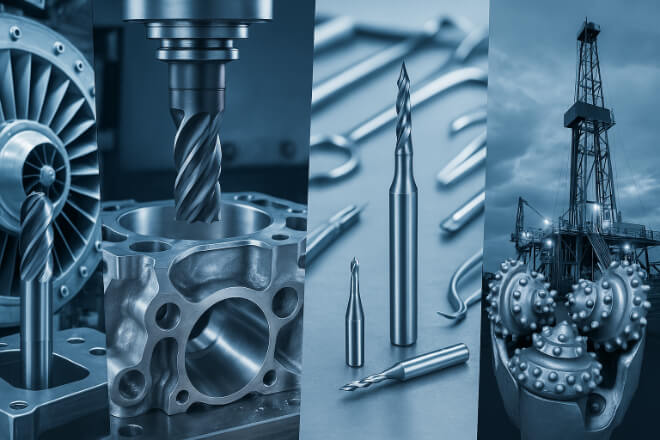
Tungsten carbide cutting tools are used across many industries including:
Ô tô: Engine blocks, transmission cases
Hàng không vũ trụ: Turbine blades, landing gear components
Medical: Surgical instruments, orthopedic implants
Oil & Gas: Drill bits, valves
General Manufacturing: Dies, molds, machine parts
No matter your field, there’s a place for carbide tools in your process.
Eco-Friendly and Recyclable
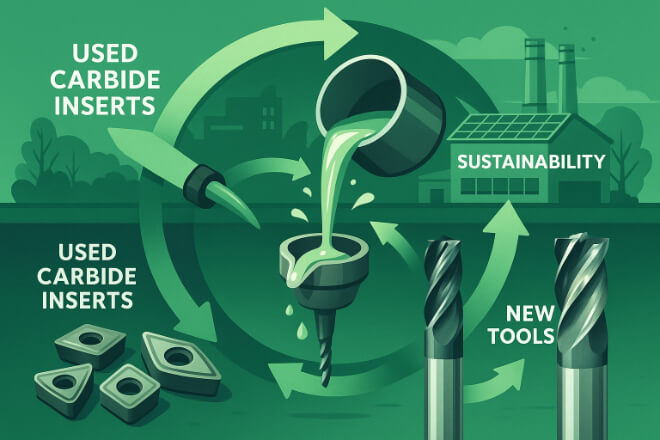
Did you know tungsten carbide is recyclable?
Many manufacturers offer buy-back or recycling programs for used tools. This reduces environmental impact and gives back some cost to your operation.
Recycling programs:
Reduce mining of raw materials
Lower carbon footprint
Support sustainability goals
Suy nghĩ cuối cùng
Tungsten carbide cutting tools are a smart investment for any company focused on performance, quality, and efficiency.
Their advantages—like long tool life, better surface finish, heat resistance, and cost-effectiveness—make them ideal for modern manufacturing environments.
Looking to upgrade your tool game? Explore premium tungsten carbide tools backed by expert support at Retopz.
